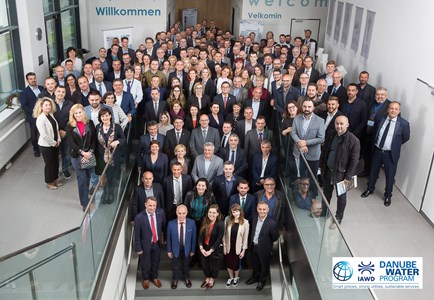
The Danube Water Conference is the Danube Water Program’s flagship event, taking place in Vienna every May since 2013. This year’s conference focused on “Achieving resilience in water and wastewater utilities in the Danube region” brought together over 200 people coming from more than 25 countries representing all stakeholders of the water sector to discuss the way forward towards smart policies, strong utilities and sustainable services.
Resiliency in water and wastewater utilities is becoming increasingly relevant globally and in the region in the context of inevitable climate change related shocks and the commitments made under the Sustainable Development Goals. The opening keynote presentation was delivered by the CEO of the Global Water Partnership, Monika Weber-Fahr, outlining the reasons for why a resilient water sector is needed and why an integrated approach to water management is required to achieve the SDGs on water. This was followed by a panel discussion with representatives from the International Commission for the Protection of the Danube River and of the Albanian Water Supply and Sewerage Association who provided their views on this topic from a water resources management and water and wastewater services perspective, respectively.
Another key component of this year’s conference was the session on Sector performance for resilient services. In 2015, the World Bank, under the umbrella of the Danube Water Program undertook a comprehensive review of the water and wastewater services in 16 countries of the Danube region. These 16 countries represent a great diversity of socio-economic, development, and geographic realities, which share a joint resource, the Danube, an intertwined history; and a common trajectory toward European integration. This regional report has now been updated with the latest available data for each of the originally participating countries.
The purpose of this session was to showcase the trends, progress and recommendations stemming from the updated review. The presentation included interactive participation from the audience using electronic tools. This was followed by case studies of utilities from the region that have participated in capacitybuilding activities under the Danube Learning Partnership (D-LeaP) and through that have achievedimprovements in their efficiency and service quality delivery.
The session was closed with a panel discussion reflecting on the previous presentations among representatives from ministry, regulator, water utility association and a local governments association. In this panel, Boran Ivanovski, NALAS Programme Officer, presented the trends in fiscal decentralization through the NALAS Fiscal Decentralization Report indicators.
“Increased fiscal autonomy of the local governments and ensuring reliable own sources of funding are key factors for better communal infrastructure investments, necessary for providing resilient services in the water sector. Also, Local Government borrowing should not be underestimated as a financial mechanism for long term capital infrastructure investments in the region of SEE”, shared Boran Ivanovski.
The Conference’s programme was further enriches with sessions on: Managing talent for resilient services, Cooperation as important tool to achieve resilient water and wastewater services, Evaluation and recast of EU water policies – status, challenges and lessons learned, How to achieve resilient wastewater treatment in the Danube region, Financing for resilient water infrastructure projects, and Water security.